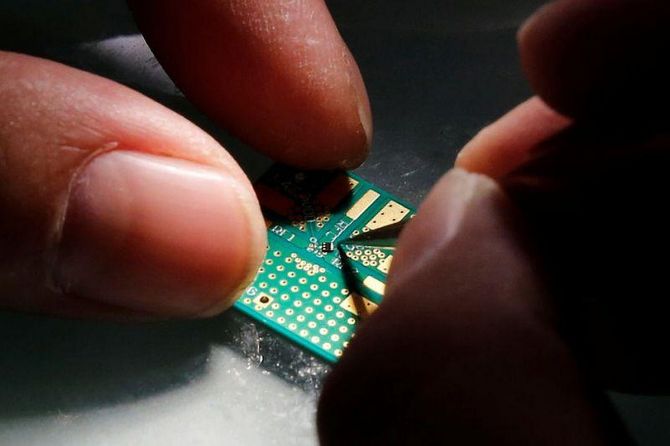As many as 2,000 chips are annually designed in India by semi-conductor and fabless companies, Intel India managing director Prakash Mallya said in a conversation with Business Standard.

Mallya was reiterating the importance of India in the semi-conductor sweepstakes.
“As much as 90 per cent of the semi-conductor companies have a design footprint in India.
"And as many as 2,000 chips are being designed annually in the country, which reflects the talent and the fact that the eco system is already in place.
"For Intel, India is their second-largest design centre in the globe and they are working on state of the art global projects in the country,” Mallya pointed out.
On the likelihood of India becoming a manufacturing hub for semi-conductors, Mallya said it’s a highly capital intensive industry and very diverse too with chips needed for anything from phones, 5G equipment to laptops and Internet of Things (IoT).
All that will require a conducive policy, great infrastructure as well as public-private partnership and industry-academia collaborations.
“Once all of these elements come together and happen consistently for multiple years, you will see great progress in creating a manufacturing eco system beyond just fabless,” Mallya said.
Intel India is collaborating with both Bharti Airtel and Reliance Jio in helping to build their 5G networks in the country.
Mallya said the engagement with Airtel was in open RAN (radio access network) and on overall network transformation.
As for Reliance Jio, it has taken a minor stake in Jio Platforms Ltd and has a collaboration in 5G, artificial intelligence and EDGE.
Intel has been a key player in the virtualisation of 4G networks based on open standards, Mallya said in an interaction.
"It is now engaged in virtualising the 5G core (the heart of the network) and will also do so in the access network side."
The company is also building software solutions to help telecom players.
The collaboration with Intel is significant as Reliance Jio is building an indigenous stand-alone 5G network which it wants to sell across the globe and take on incumbent telecom gear makers like Ericcson and Nokia amongst others.
Bharti Airtel is in a tie-up with the Tatas to build open RAN networks and plans to test them by April next year.
On key areas of technological transformation which India may see in 2022, Mallya said one is the growing adoption of cloud as a delivery system whether it is in payments or e-commerce.
Also, the pandemic has inspired a rethink on whether one should move jobs to where talent is located and not the other way round.
And, increasingly the ecosystem will become diverse with many start-ups, new age firms coming in and altering the earlier trajectory in which one saw some big companies and a lot of SMEs.
Finally, all this will be fuelled by localised infrastructure, including 5G and Cloud.
“These four would change the ecosystem dramatically in the next few years” said Mallya.
At the global level, the key shifts which Intel sees is the move from cloud to EDGE computing and pervasive connectivity which will have a dramatic impact on areas such as agriculture and healthcare.
Photograph: Kim Kyung-Hoon/Reuters












 © 2025
© 2025